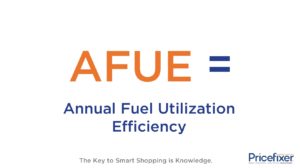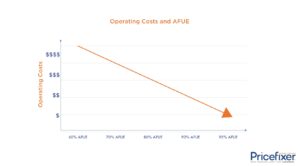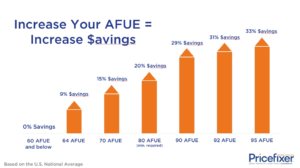The Acronym AFUE stands for Annual Fuel Utilization Efficiency and is an indication of how efficient a furnace is at converting fuel to heat. AFUE is measured as a percentage, and the higher the rating, the greater the fuel efficiency. Please read below for further demystifications on AFUE, so you can decide which level of efficiency is best for your needs and budget.
Here’s what we will cover below:
Your Personal Efficiency Guide to AFUE includes –
- Definition
- Word Breakdown
- John and Rita’s Story/Quick Video Explanation
- AFUE Mathematics
- FTC and US Department of Energy
- What does AFUE have to do with MPG?
- 4 Questions for Clarity
- Benefits and Regulation
- Types of Fuel
The Introduction to AFUE
If you live in Florida, where the Pricefixer corporate offices are located, you most likely lean toward traditional condensing units to cool your home as your primary temperature control method. However, you never know when a cold front is going to come through, so it’s essential to be prepared to weather the fallout from the storms. If you’re in other parts of the United States such as the chillier climate near the Great Lakes or throughout the mid-west, you are certainly going to be interested in educating yourself about furnaces and AFUE, especially if you own a home or are considering becoming a homeowner. So, what exactly is AFUE, and why does it matter to you? Read below for a clear definition and your complete personal efficiency guide to AFUE, and to review supporting visuals like photos and a video explainer depicting John and Rita’s story, if you prefer to watch instead.

Definition
The acronym AFUE stands for Annual Fuel Utilization Efficiency. It’s important to understand what AFUE means while contemplating the purchase of a furnace for your home, because a misunderstanding could lead to a lot of lost money, time and effort. The overall definition of AFUE, in neophyte terms, is a measurement of the efficiency level of the furnace to utilize the fuel within. To examine this concept a bit deeper, the amount of heat a furnace produces in direct relationship to the amount of fuel used is called, AFUE.

An AFUE furnace that is 92% efficient means that for every $100 of gas consumed, it will generate $92 worth of useable heat. To find out where that $8 goes, watch the video below.
But, if you’re still unsure, no worries because there’s an even more in-depth definition, and beyond that, we will give you another example.
Word Breakdown
Let’s break it down here into individual word segments. Annual refers to the efficiency on a yearly basis, and how well your system performs over a 12-month time span. Fuel is a material that is burned to produce power, or to produce heat, in this instance. A few examples of fuel in this application could be heating oil, natural gas or propane. The word Utilization refers to the action of making use of something in a practical way. Efficiency is the part of the acronym that is defined by the productivity level of a system or machine (or furnace, in this instance) to achieve the highest levels of output. These words make up the larger concept of Annual Fuel Utilization Efficiency, and when you can break it down into smaller meaningful parts, sometimes the explanation becomes more digestible. Please note, AFUE does not refer to the electricity usage of your furnace or boiler, it directly refers to the fuel efficiency of the equipment in regard to gas, propane or oil.
For a Quick Video Explanation, Click Here!
AFUE Mathematics
Now, let’s get into AFUE by the numbers, and what they mean. Newly manufactured furnaces vary in levels of AFUE from efficiency levels of 80% up to the level of 98%. (Lower efficiency models exist in some homes built before energy efficiency standards were put into place by governing agencies. So, it is possible your home has a much lower level of AFUE. More on that later.) For now, back to the example: this means a furnace with 90 AFUE will convert 90% of the equipment’s fuel consumption to consumable heat. Sounds great, right?
So, when you look at an 80 AFUE furnace, it will convert 80% of the fuel consumption to heat. So, how much heat does a 98 AFUE furnace convert? Well, now you are armed with all the powerful information! Now you know a 98 AFUE furnace will convert 98% of fuel to consumable heat, and so on. Your knowledge in heating will make it much easier for you to determine the best system for your needs when the time comes. If you take 100% and you subtract the amount of AFUE, you will know the amount of heat loss your equipment will be responsible for. For example, in an 80 AFUE furnace, 20% of the heat produced escapes through the chimney or other places.
FTC and US Department of Energy
The FTC or Federal Trade Commission has guidelines in place that make it a requirement for manufacturers of furnaces and boilers to display the AFUE on equipment so consumers like you can determine the energy efficiency of your system. There are also a plethora of rules and notices put forth by the U.S. Department of Energy that delve deeper into the standards of operations for consumer furnaces and more, available here.
What does AFUE have to do with MPG?
Another way to think about AFUE is to draw a parallel to a similar topic that you may have dealt with in your lifetime. For every dollar of fuel consumed, AFUE measures the amount of heat produced. Here’s an example for you that will put you on a clear path to strong knowledge around this topic. You can compare the way AFUE applies to: heat a furnace produces, similarly to the miles per gallon on a car, SUV or truck you are considering purchasing. If you’re not currently in the market, perhaps at some time you were, or know of someone who has been. For this purpose, let’s use you for the example.
Your fuel costs will increase the lower your AFUE, and similarly, the money you spend on fuel for a higher AFUE heating system will be less than what you spend on a low efficiency system. The higher the efficiency, the less money the equipment will cost you to operate, specifically regarding fuel. (See graph below.) When your vehicle gets 30 MPG or miles per gallon, it has better fuel efficiency than, say, a larger gas-guzzler that might only get 12 to 15 MPG.

When you go to the dealership, do you purchase the vehicle based solely on the miles per gallon it gets? Or do you make your decision based on multiple factors that ultimately weigh into examining and determining your best option?
Questions for Clarity
Some other factors you should consider are:
- Usage
Ask yourself this: Do you run your furnace or boiler year-round? - Homeownership plan.
Ask yourself this: How long will you live in your home? - Cost
Ask yourself this: Am I prepared to invest in a higher-efficiency furnace that will cost more money up-front to purchase?
- Repair or replace?
Ask yourself this: Does it make more sense to repair or retrofit my current furnace or boiler, or to replace it altogether?

Benefits and Regulation
If you are most interested in a high efficiency, or 80+ AFUE heating system, consider keeping your eyes open for an ENERGY STAR® label, which can be found on the most efficient models. The government standard on new heating equipment is a minimum of 80 AFUE, so no matter what, when you purchase a new furnace or boiler, make sure it operates to this level of efficiency and that the equipment is clearly labeled.
Types of Fuel
Types of fuel utilized within your heating system bear a significant weight on the costs of operating the equipment, additionally. Different types of fuel include natural gas, propane, heating oil, firewood and more. For details on fuel types and associated AFUE, check out our post here. (insert link to fuel article.)
If you prefer an electricity-operated system instead of a fuel-reliant method such as a boiler or furnace, you can learn more about heat pumps here. (insert link to heat pump blog.)
Here is a recap of what was covered in this article:
- Definition
- Word Breakdown
- John and Rita’s Story/Quick Video Explanation
- AFUE Mathematics
- FTC and US Department of Energy
- What does AFUE have to do with MPG?
- 4 Questions for Clarity
- Benefits and Regulation
- Types of Fuel
To learn more about replacing your heating unit, click here.